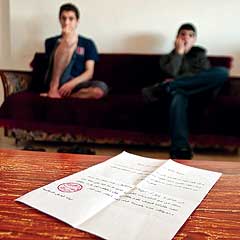Family caught in Lebanese limbo
By Michael Swan, The Catholic Register The Army of the Murabi Islamic Iraq State doesn’t like what Fuad Benan Kakos did for a living, and if they ever catch him they’re going to kill him. They gave him and his family a three-day head start. Fuad, Jacqueline and their sons David and Eliot have been in Beirut just over a year.
The Army of the Murabi Islamic Iraq State doesn’t like what Fuad Benan Kakos did for a living, and if they ever catch him they’re going to kill him. They gave him and his family a three-day head start. Fuad, Jacqueline and their sons David and Eliot have been in Beirut just over a year.The family had lived in the Christian neighbourhood of Zafaraniyya in Baghdad. Fuad made a modest living running a shop that had a dangerous sideline: under-the-counter liquor sales — legal for Christians under Iraqi law, but dangerous if the mujahedeen find out.
Fuad had hoped to take his family to the United States, but the American embassy wants answers to many questions about his years of military service, more than 10 years ago. He says he was a cook and a waiter in an army commissary. The Americans want to know who were his officers, where did he serve, what kind of food did he serve?
Western embassy staff who interview refugees for resettlement are frustrated by the number of cooks, waiters and drivers who show up seeking resettlement, having lost their official army service record book. It’s as though the entire Iraqi army consisted of cooks and drivers and ordinary soldiers of no rank. Nobody claims to have carried a rifle, there were apparently no sergeants or lieutenants, despite the eight-year war with Iran, the first Gulf War and the 2003 American invasion.
Fuad and his family are still hopeful of going to the West. They can’t go back and they will never have the right to permanent residency or the right to work in Lebanon.
Their world gets smaller and smaller. Eliot, almost 13, goes to school — though he doesn’t like it.
His 16-year-old brother David couldn’t adjust to his Lebanese school, where the language of instruction is French, not Arabic.
David dreams of starting a life in America, returning to school and having a career in construction.
“In America, you have your own table, your own chair,” he said of schools.
With the crush of refugee students crowding the school in Beirut, David found classrooms without enough books, chairs or desks for the class.
Though Jacqueline spends all day, week after week, stuck in the apartment off Za Aytiryya, the mention of Iraq makes her furious.
“I never saw anything positive or any happiness in Iraq. We didn’t get our rights, or any life,” she said.
Please support The Catholic Register
Unlike many media companies, The Catholic Register has never charged readers for access to the news and information on our website. We want to keep our award-winning journalism as widely available as possible. But we need your help.
For more than 125 years, The Register has been a trusted source of faith-based journalism. By making even a small donation you help ensure our future as an important voice in the Catholic Church. If you support the mission of Catholic journalism, please donate today. Thank you.
DONATE
